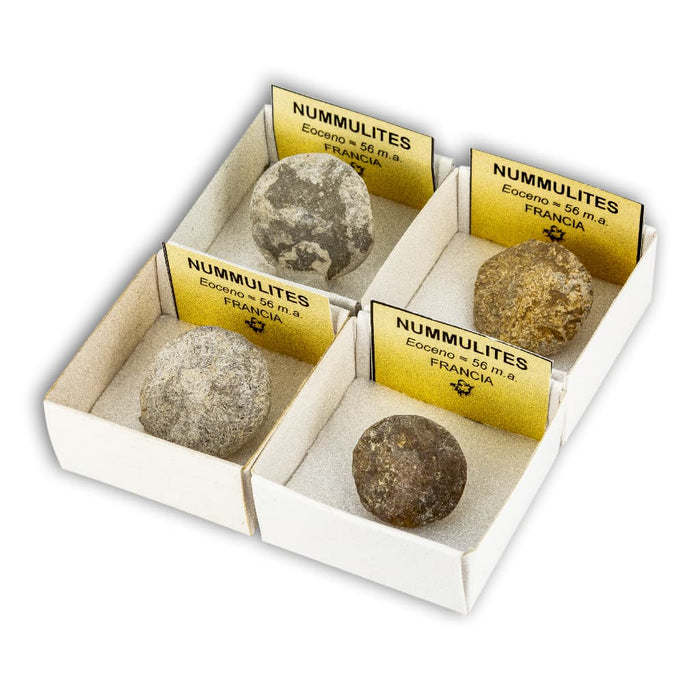
Nummulites in Collection Box 4x4 cm
Devoluciones fáciles
Tienes hasta 30 días para cambiar o devolver los productos
|
Species |
nummulites |
|
Geological Period |
Eocene ≈ 56 ma |
|
Origin |
France |
|
Size |
2.0 - 3.0cm |
Nummulites in 4x4 cm box format.
Nummulites (from Latin nummulus 'little coin') is a genus of extinct benthic foraminifera in the family Nummulitidae.
The "Nummulites" were unicellular animal organisms (protozarians) that lived in the seas of the Paleocene and Eocene, between 66 and 40 million years ago.
Their shells are frequently found as fossils and can reach 6 cm in diameter. They are common in the Cenozoic rocks of the ancient Tethys Sea, particularly in Eocene limestone deposited around the present-day Mediterranean. They are of great interest as guide fossils.
The fossil includes a label with the name, period and provenance and is attached to a 4 cm square cardboard box.
*The price is per unit (a single cardboard box of the four shown in the photo)
Since the samples are natural, you will receive a piece similar to the one in the photograph. The fossils come in cardboard boxes and are glued to a porex base with hot silicone; these can be detached using ethyl alcohol without damaging the fossil. The size is approximate.
Envíos y Devoluciones
Existen 2 tarifas de envíos en función de la zona y el tiempo de entrega:
EXPRES | 24H - España peninsular
ESTÁNDAR | 48H - España peninsular
BALEARES | 48-72H - Islas Baleares
*Para Portugal hay opción de envío en 48 horas y este nunca será gratuito.
*En el caso de las Islas Baleares, es necesario elegir el método de envío especial de Islas Baleares y este nunca será gratuito.
*No se realizan envíos a las Islas Canarias, Ceuta y Melilla.
Envio Gratis en pedidos superiores a 50€. Envios en 24/48H
ENVIOS PARA EUROPA
Se realizan envíos a:
Bélgica, Francia, Alemania e Italia con un periodo de entrega de 4 a 10 días hábiles.
Estos envíos nunca serán gratuitos y se calculará la tarifa en el momento de introducir la dirección en la pantalla de pago.
PARA VER MÁS INFORMACIÓN PINCHA AQUI
Los pedidos realizados antes de las 12:00 horas serán enviados en el día, después de esa hora pasarán a ser enviados al día siguiente.
Los fines de semana no se hacen entregas. Todos los pedidos realizados durante el fin de semana o festivo pasarán a ser gestionados el lunes o el día siguiente laboral.
Ten en cuenta que en épocas de rebajas o navidad, nuestros tiempos de envios pueden verse afectados debido al gran volumen de trabajo soportado.
DEVOLUCIONES
Devolución dentro de 30 días naturales a partir de la recepción del paquete, siempre y cuando se respete el embalaje original y no haya daños en la pieza. Para más información, consulta nuestra Política de Devoluciones
Guía de Tamaños
¿Tienes dudas sobre los tamaños de las muestras? Mira nuestra guía de tamaños
